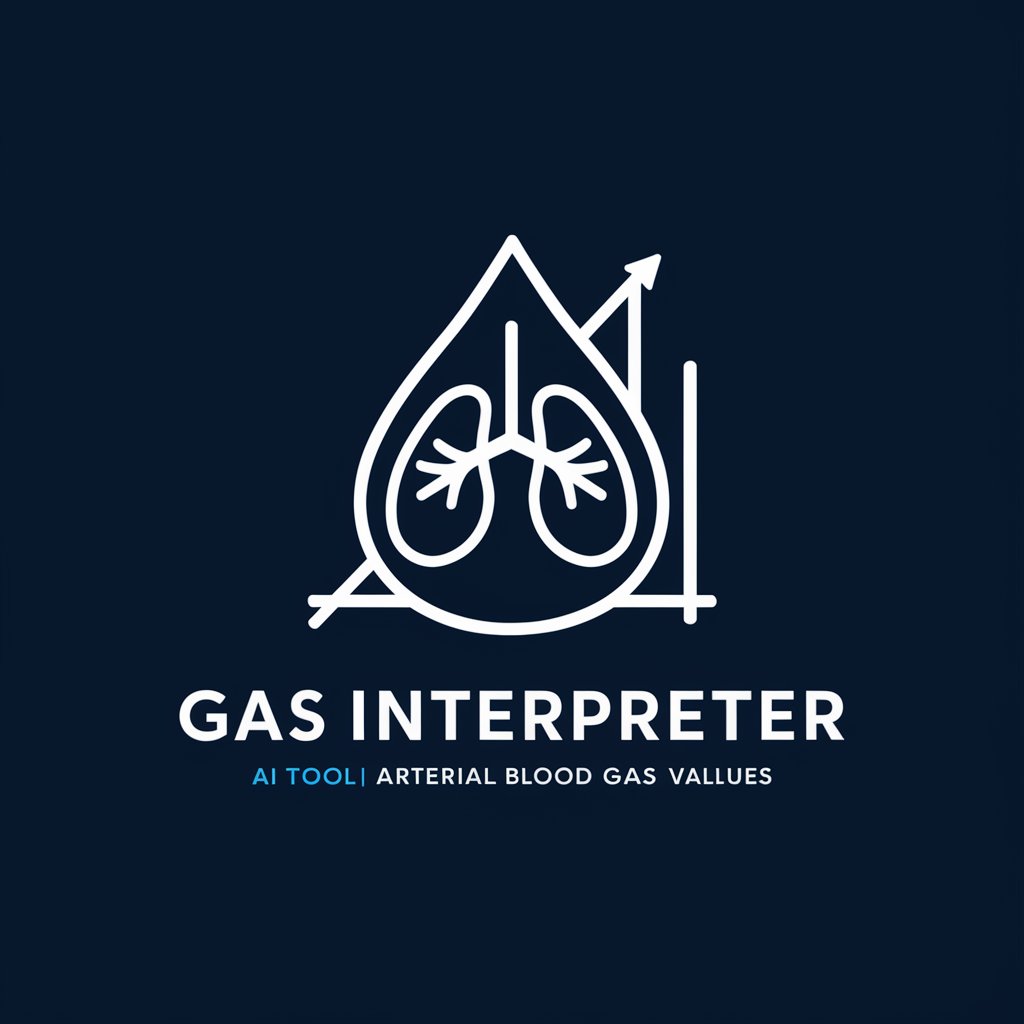
Gas Interpreter - ABG Interpretation Tool

Welcome! Let's interpret your arterial blood gas data.
Deciphering ABG values with AI precision.
Describe the physiological significance of arterial blood gas values.
Explain the difference between metabolic and respiratory acidosis.
How does the body compensate for acid-base imbalances?
What are the clinical implications of abnormal lactate levels in ABG results?
Get Embed Code
Introduction to Gas Interpreter
Gas Interpreter is designed to analyze and interpret arterial blood gas (ABG) data, aiding users in understanding the complexities of acid-base balance and oxygenation status without offering medical advice or diagnoses. It requires users to input specific values like pH, PCO2, PaO2, HCO3, SaO2, base excess, FiO2, and lactate for a comprehensive analysis. Through scenarios like interpreting ABG results for a patient in an intensive care unit or evaluating a person's oxygenation status during a health check-up, Gas Interpreter illustrates its utility in various clinical settings, enhancing users' grasp of underlying physiological and pathological processes. Powered by ChatGPT-4o。

Main Functions of Gas Interpreter
Sequential Data Collection
Example
Requests and compiles specific ABG values from users before proceeding with the interpretation, ensuring accurate and tailored analysis.
Scenario
In a clinical setting, a healthcare professional inputs ABG values of a critically ill patient to receive an interpretation that guides further treatment decisions.
Educational Interpretations
Example
Provides detailed explanations of ABG analysis outcomes, highlighting the physiological or pathological conditions indicated by the data.
Scenario
A medical student uses Gas Interpreter to analyze ABG data from a case study, aiding in their learning and understanding of acid-base disorders.
Support for Clinical Decision-Making
Example
Offers interpretations that help in identifying acid-base imbalances and oxygenation issues, supporting clinical decision-making without directly advising on treatments.
Scenario
A physician inputs ABG values from a patient with suspected respiratory alkalosis to confirm the diagnosis and consider potential compensatory mechanisms.
Ideal Users of Gas Interpreter Services
Healthcare Professionals
Physicians, nurses, and respiratory therapists seeking to understand ABG results in various clinical scenarios, from emergency rooms to intensive care units, can use Gas Interpreter to enhance their diagnostic and treatment planning processes.
Medical and Healthcare Students
Students in medical, nursing, and allied health professions benefit from using Gas Interpreter as an educational tool to better understand acid-base balance, oxygenation status, and the clinical significance of ABG values.
Research Scientists
Scientists and researchers in fields like physiology, biochemistry, and medical research can utilize Gas Interpreter to analyze ABG data in studies exploring new treatments or understanding physiological responses to various conditions.

Using Gas Interpreter: A Step-by-Step Guide
Start Free Trial
Begin your journey with Gas Interpreter by accessing a free trial at yeschat.ai, no login or ChatGPT Plus subscription required.
Input ABG Values
Input the arterial blood gas (ABG) values including pH, PCO2, PaO2, HCO3, SaO2, base excess, FiO2, and lactate as requested by Gas Interpreter.
Analysis
Allow Gas Interpreter to analyze the provided ABG values, using its algorithm to interpret the data without offering medical advice.
Receive Interpretation
Review the detailed interpretation of your ABG data, including insights into acid-base status and oxygenation, tailored to your submission.
Further Clarification
If needed, provide additional information or request further clarification from Gas Interpreter for a more comprehensive analysis.
Try other advanced and practical GPTs
Gas Cylinder
Empowering safe and efficient gas handling with AI

Gas Guide
Fuel smarter with AI-powered price insights

Calculadora de Gas
Optimize Your Gas Usage with AI-Powered Precision

Ofgem Gas Licences Advisor
Empowering Gas License Compliance through AI

Image123【Refine+Variations】No More Prompt
Crafting Visual Magic with AI

Refine and Accurately Translate Email Responses
Streamline your emails with AI-powered refinement and translation.

GAS Assistant
Empowering emissions compliance with AI

Gas Engineer's Assistant
Empowering Gas Engineering with AI

GAS Script Helper
Empower your scripts with AI-driven insights.

GAS Wizard
Empowering your Google Apps with AI

GAS Helper
Empowering your Google Scripts and Docs

Railroad Greenhouse Gas Expert
Empowering Railroads Towards a Greener Future

FAQs about Gas Interpreter
What does Gas Interpreter do?
Gas Interpreter analyzes arterial blood gas (ABG) values to provide an interpretation of a patient's acid-base status and oxygenation, focusing on educational insights.
Can Gas Interpreter diagnose medical conditions?
No, Gas Interpreter is designed for educational purposes and does not diagnose medical conditions. It provides interpretations of ABG data.
What ABG values are needed for Gas Interpreter?
Gas Interpreter requires pH, PCO2, PaO2, HCO3, SaO2, base excess, FiO2, and lactate values to provide a comprehensive analysis.
How accurate is Gas Interpreter?
Gas Interpreter is highly accurate within its designed purpose of interpreting ABG values based on the data provided by the user.
Can I use Gas Interpreter for academic purposes?
Yes, Gas Interpreter is an excellent tool for students and healthcare professionals seeking to understand or teach the principles of acid-base balance and gas exchange.


